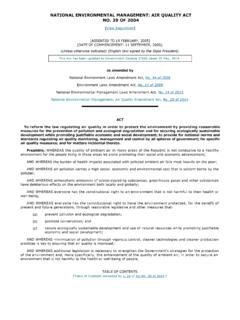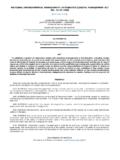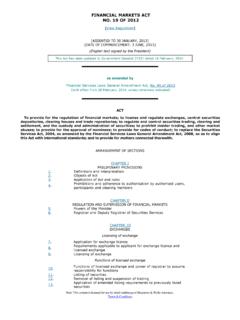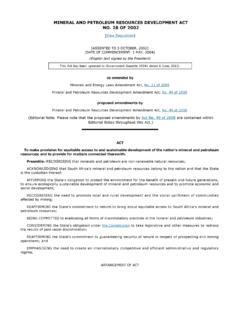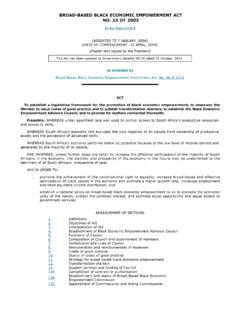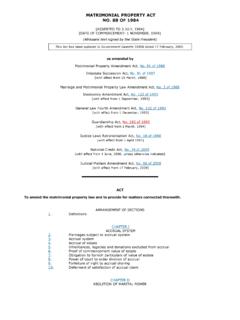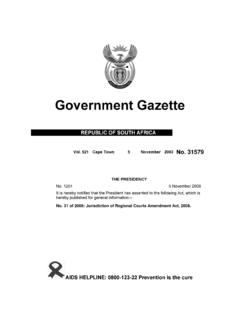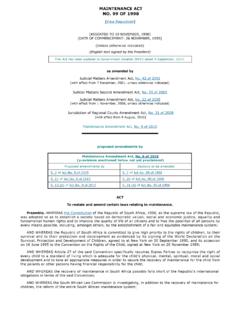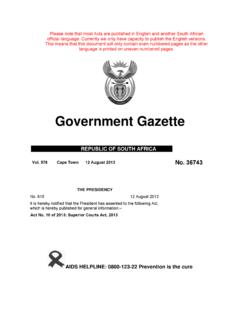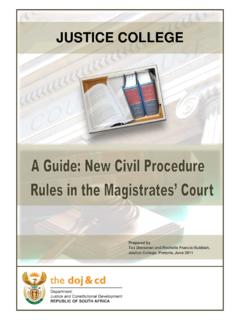Transcription of DIVORCE ACT NO. OF 1979 - Shepstone & Wylie
1 DIVORCE ACT NO. 70 OF 1979 [ASSENTED TO 8 JUNE, 1979] [DATE OF COMMENCEMENT: 1 JULY, 1979] (Afrikaans text signed by the State President) This Act has been updated to Government Gazette 33448 dated 6 August, 2010. as amended by Matrimonial Property Act, No. 88 of 1984 Transfer of Powers and Duties of the State President Act, No. 97 of 1986 [with effect from 3 October, 1986] Mediation in Certain DIVORCE Matters Act, No. 24 of 1987 Marriage and Matrimonial Property Law Amendment Act, No. 3 of 1988 DIVORCE Amendment Act, No. 7 of 1989 Domicile Act, No. 3 of 1992 DIVORCE Amendment Act, No. 44 of 1992 Justice Laws Rationalisation Act, No. 18 of 1996 [with effect from 1 April 1997] Films and Publications Act, No. 65 of 1996 [with effect from 1 June, 1998] DIVORCE Amendment Act, No. 95 of 1996 DIVORCE Courts Amendment Act, No. 65 of 1997 Judicial Matters Second Amendment Act, No.
2 55 of 2003 Jurisdiction of Regional Courts Amendment Act, No. 31 of 2008 [with effect from 9 August, 2010] ACT To amend the law relating to DIVORCE and to provide for incidental matters. 1. 2. 3. 4. 5. 5A. 6. 7. 8. 9. 10. 11. 12. 13. 14. ARRANGEMENT OF SECTIONS Definitions Jurisdiction Dissolution of marriage and grounds of DIVORCE Irretrievable break-down of marriage as ground of DIVORCE Mental illness or continuous unconsciousness as grounds of DIVORCE Refusal to grant DIVORCE Safeguarding of interests of dependent and minor children Division of assets and maintenance of parties Rescission, suspension or variation of orders Forfeiture of patrimonial benefits of marriage Costs Procedure Limitation of publication of particulars of DIVORCE action Recognition of certain foreign DIVORCE orders Abolition of orders for restitution of conjugal rights and judicial separation 15. 16. 17.
3 18. 19. Schedule Application of Act Repeal of laws Short title and commencement 1. (1) In this Act, unless inconsistent with the context- "court" means any High Court as contemplated in section 166 of the Constitution of the Republic of South Africa, 1996, or a court for a regional division contemplated in section 29 (1B) of the Magistrates' Courts Act, 1944 (Act No. 32 of 1944), which has jurisdiction with respect to a DIVORCE action [Definition of "court" substituted by s. 4 of Act No. 65 of 1997 and by s. 10 (2) of Act No. 31 of 2008.] Wording of Sections " DIVORCE action" means an action by which a decree of DIVORCE or other relief in connection therewith is applied for, and includes- (a) an application pendente lite for an interdict or for the interim custody of, or access to, a minor child of the marriage concerned or for the payment of maintenance or (b) an application for a contribution towards the costs of such action or to institute such action, or make such application, in forma pauperis, or for the substituted service of process in, or the edictal citation of a party to, such action or such application "Family advocate".
4 "pension fund" means a pension fund as defined in section 1 (1) of the Pension Funds Act, 1956 (Act No. 24 of 1956), irrespective of whether the provisions of that Act apply to the pension fund or not [Definition of "pension fund" added by s. 1 of Act No. 7 of 1989.] "pension interest", in relation to a party to a DIVORCE action who- (a) is a member of a pension fund (excluding a retirement annuity fund), means the benefits to which that party as such a member would have been entitled in terms of the rules of that fund if his membership of the fund would have been terminated on the date of the DIVORCE on account of his resignation from his office (b) is a member of a retirement annuity fund which was bona fide established for the purpose of providing life annuities for the members of the fund, and which is a pension fund, means the total amount of that party's contributions to the fund up to the date of the DIVORCE , together with a total amount of annual simple interest on those contributions up to that date, calculated at the same rate as the rate prescribed as at that date by the Minister of Justice in terms of section 1 (2)
5 Of the Prescribed Rate of Interest Act, 1975 (Act No. 55 of 1975), for the purposes of that Act [Definition of "pension interest" added by s. 1 of Act No. 7 of 1989.] "rules", in relation to a pension fund, means rules as defined in section 1 (1) of the Pension Funds Act, 1956. [Definition of "rules" added by s. 1 of Act No. 7 of 1989.] (2) For the purposes of this Act a DIVORCE action shall be deemed to be instituted on the date on which the summons is issued or the notice of motion is filed or the notice is delivered in terms of the rules of court, as the case may be. 2. (1) A court shall have jurisdiction in a DIVORCE action if the parties are or either of the parties is- (a) domiciled in the area of jurisdiction of the court on the date on which the action is instituted or (b) ordinarily resident in the area of jurisdiction of the court on the said date and have or has been ordinarily resident in the Republic for a period of not less than one year immediately prior to that date.
6 [Sub-s. (1) substituted by s. 6 (a) of Act No. 3 of 1992.] Wording of Sections (2) A court which has jurisdiction in terms of subsection (1) shall also have jurisdiction in respect of a claim in reconvention or a counter-application in the DIVORCE action concerned. [Sub-s. (2) amended by s. 6 (b) of Act No. 3 of 1992.] Wording of Sections (3) A court which has jurisdiction in terms of this section in a case where the parties are or either of the parties is not domiciled in the Republic shall determine any issue in accordance with the law which would have been applicable had the parties been domiciled in the area of jurisdiction of the court concerned on the date on which the DIVORCE action was instituted. [Sub-s. (3) substituted by s. 6 (c) of Act No. 3 of 1992.] Wording of Sections (4) The provisions of this Act shall not derogate from the jurisdiction which a court has in terms of any other law or the common law.
7 3. Dissolution of marriage and grounds of marriage may be dissolved by a court by a decree of DIVORCE and the only grounds on which such a decree may be granted are- (a) the irretrievable break-down of the marriage as contemplated in section 4 (b) the mental illness or the continuous unconsciousness, as contemplated in section 5, of a party to the marriage. 4. Irretrievable break-down of marriage as ground of (1) A court may grant a decree of DIVORCE on the ground of the irretrievable break-down of a marriage if it is satisfied that the marriage relationship between the parties to the marriage has reached such a state of disintegration that there is no reasonable prospect of the restoration of a normal marriage relationship between them. (2) Subject to the provisions of subsection (1), and without excluding any facts or circumstances which may be indicative of the irretrievable break-down of a marriage, the court may accept evidence- (a) that the parties have not lived together as husband and wife for a continuous period of at least one year immediately prior to the date of the institution of the DIVORCE action (b) that the defendant has committed adultery and that the plaintiff finds it irreconcilable with a continued marriage relationship or (c) that the defendant has in terms of a sentence of a court been declared an habitual criminal and is undergoing imprisonment as a result of such sentence, as proof of the irretrievable break-down of a marriage.
8 (3) If it appears to the court that there is a reasonable possibility that the parties may become reconciled through marriage counsel, treatment or reflection, the court may postpone the proceedings in order that the parties may attempt a reconciliation. (4) Where a DIVORCE action which is not defended is postponed in terms of subsection (3), the court may direct that the action be tried de novo, on the date of resumption thereof, by any other judge of the court concerned. 5. Mental illness or continuous unconsciousness as grounds of (1) A court may grant a decree of DIVORCE on the ground of the mental illness of the defendant if it is satisfied- (a) that the defendant in terms of the Mental Health Act, 1973 (Act No. 18 of 1973)- (i) has been admitted as a patient to an institution in terms of a reception order (ii) is being detained as a State patient at an institution or other place specified by the Minister of Correctional Services or [Sub-para.]
9 (ii) amended by s. 4 of Act No. 18 of 1996.] Wording of Sections (iii) is being detained as a mentally ill convicted prisoner at an institution, [Sub-para. (iii) amended by s. 4 of Act No. 18 of 1996.] Wording of Sections and that he has, for a continuous period of at least two years immediately prior to the institution of the DIVORCE action, not been discharged unconditionally as such a patient, State patient or mentally ill prisoner and (b) after having heard the evidence of at least two psychiatrists, of whom one shall have been appointed by the court, that the defendant is mentally ill and that there is no reasonable prospect that he will be cured of his mental illness. [Sub-s. (1) amended by s. 4 of Act No. 18 of 1996.] Wording of Sections (2) A court may grant a decree of DIVORCE on the ground that the defendant is by reason of a physical disorder in a state of continuous unconsciousness, if it is satisfied- (a) that the defendant's unconsciousness has lasted for a continuous period of at least six months immediately prior to the institution of the DIVORCE action and (b) after having heard the evidence of at least two medical practitioners, of whom one shall be a neurologist or a neurosurgeon appointed by the court, that there is no reasonable prospect that the defendant will regain consciousness.
10 (3) The court may appoint a legal practitioner to represent the defendant at proceedings under this section and order the plaintiff to pay the costs of such representation. (4) The court may make any order it may deem fit with regard to the furnishing of security by the plaintiff in respect of any patrimonial benefits to which the defendant may be entitled by reason of the dissolution of the marriage. (5) For the purposes of this section the expressions "institution", "mental illness", "patient", "State patient" and "reception order" shall bear the meaning assigned to them in the Mental Health Act, 1973. [Sub-s. (5) amended by s. 4 of Act No. 18 of 1996.] Wording of Sections 5A. Refusal to grant it appears to a court in DIVORCE proceedings that despite the granting of a decree of DIVORCE by the court the spouses or either one of them will, by reason of the prescripts of their religion or the religion of either one of them, not be free to remarry unless the marriage is also dissolved in accordance with such prescripts or unless a barrier to the remarriage of the spouse concerned is removed, the court may refuse to grant a decree of DIVORCE unless the court is satisfied that the spouse within whose power it is to have the marriage so dissolved or the said barrier so removed, has taken all the necessary steps to have the marriage so dissolved or the barrier to the remarriage of the other spouse removed or the court may make any other order that it finds just.
